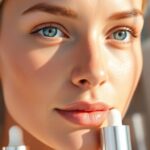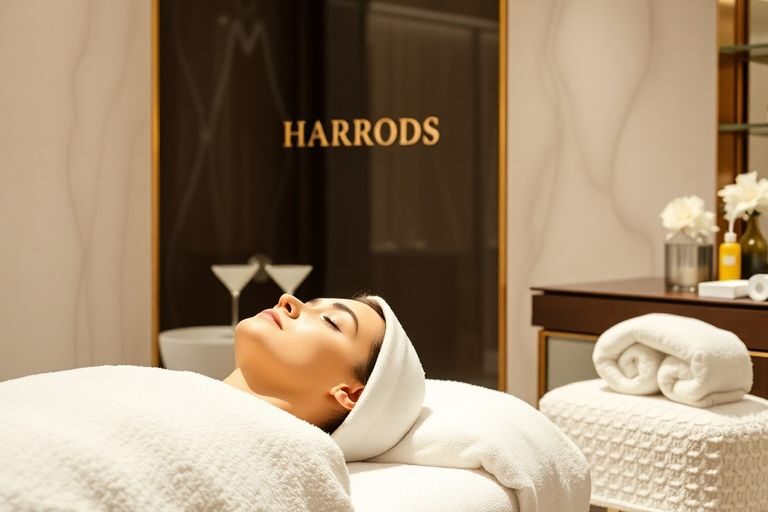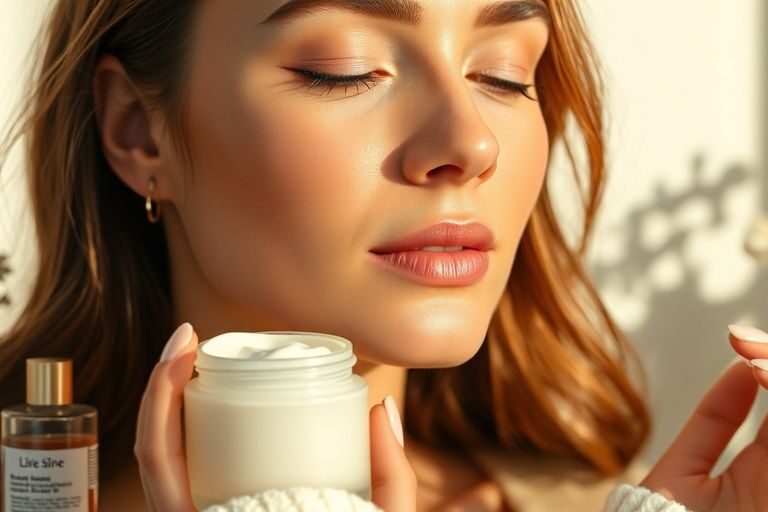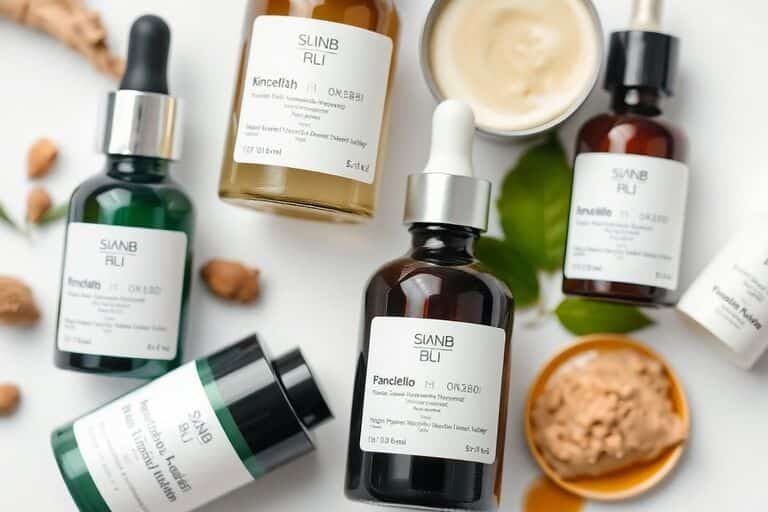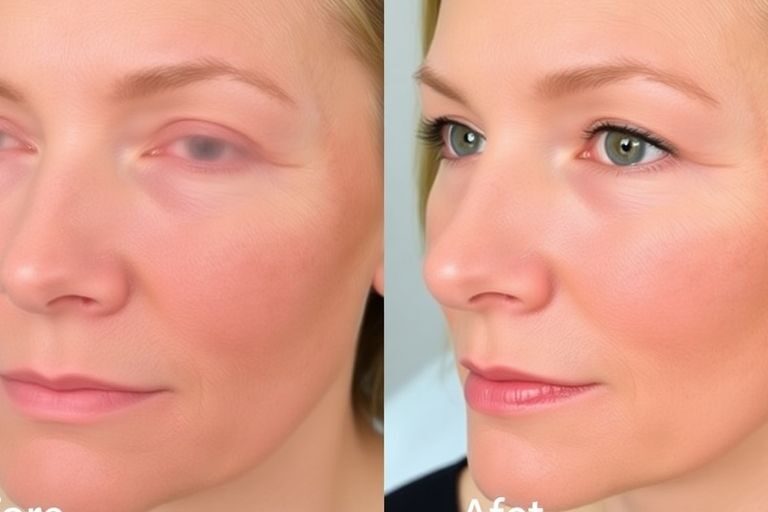Dealing with acne scars and hyperpigmentation can be a frustrating journey. Many people struggle with these skin issues, often feeling overwhelmed by the sheer number of products and treatments available. This guide aims to simplify the process by providing clear, practical advice on effective skincare for acne scars and hyperpigmentation. You’ll find everything from understanding the conditions to building a tailored skincare routine and exploring professional treatments.
Key Takeaways
- Acne scars and hyperpigmentation are common but treatable skin concerns.
- Incorporating Vitamin C and retinoids into your routine can significantly improve skin tone and texture.
- A consistent skincare routine, including morning and evening steps, is essential for effective results.
- Professional treatments like chemical peels and laser therapy can enhance your skincare efforts.
- Daily habits, like using sunscreen and staying hydrated, play a crucial role in maintaining healthy skin.
Understanding Acne Scars And Hyperpigmentation

Right, let’s get into the nitty-gritty of acne scars and hyperpigmentation. It’s something I’ve dealt with myself, and honestly, understanding what’s going on with your skin is half the battle. So, let’s break it down.
Defining Acne Scars
Acne scars are basically the aftermath of inflamed acne. When your skin tries to repair itself after a breakout, sometimes it doesn’t quite get it right. This can lead to different types of scars, and it’s not just about those raised or pitted marks you might think of. The severity of the acne often dictates the likelihood and type of scarring.
- Atrophic Scars: These are the depressed ones, like ice pick or boxcar scars.
- Hypertrophic Scars: Raised scars, usually firmer than the surrounding skin.
- Keloid Scars: A more severe form of raised scar that can grow beyond the original acne site.
What Is Hyperpigmentation?
Hyperpigmentation is a fancy word for dark spots or patches on your skin. It happens when your skin produces too much melanin – that’s the pigment that gives your skin its colour. Acne can trigger this, leaving behind post-inflammatory hyperpigmentation (PIH) after the spot has cleared. It’s super common, especially if you’ve been picking at your spots (guilty!).
Types of Hyperpigmentation
There are a few different types of hyperpigmentation, and knowing which one you’re dealing with can help you choose the right treatment. Here’s a quick rundown:
- Post-Inflammatory Hyperpigmentation (PIH): This is what we’re mainly talking about here – the dark spots left after acne. It can be red, brown, or even purple-ish.
- Melasma: Often triggered by hormonal changes (like pregnancy or birth control), melasma usually appears as symmetrical patches on the face.
- Sunspots (Solar Lentigines): These are caused by sun exposure and tend to pop up on areas that get a lot of sun, like your face, hands, and chest.
Dealing with acne scars and hyperpigmentation can be frustrating, but remember, you’re not alone. Understanding the underlying causes and different types is the first step towards finding a skincare routine that works for you. It’s all about being patient and consistent – and maybe laying off the spot-picking!
Key Ingredients For Effective Skincare
Alright, let’s get down to the nitty-gritty – the ingredients that can actually make a difference in fading those pesky acne scars and hyperpigmentation. I’ve tried a bunch of stuff over the years, and these are the ones I keep coming back to.
Vitamin C: The Brightening Powerhouse
Vitamin C is like the superhero of skincare. It’s a potent antioxidant that not only brightens your skin but also protects it from environmental damage. I love using it in the morning to give my skin a boost. It helps to even out my skin tone and fade those annoying dark spots. Plus, it’s great for boosting collagen production, which is always a win.
Retinoids: Accelerating Skin Renewal
Retinoids are basically vitamin A derivatives, and they’re total game-changers. They work by speeding up cell turnover, which means they help shed old, damaged skin cells and bring fresh ones to the surface. This is amazing for reducing the appearance of scars and hyperpigmentation. I started using retinol products a few years ago, and the difference has been incredible. Just remember to start slow, as they can be a bit irritating at first.
Exfoliating Acids: AHAs and BHAs
AHAs (alpha-hydroxy acids) and BHAs (beta-hydroxy acids) are chemical exfoliants that work wonders. AHAs are great for surface-level exfoliation, helping to brighten skin and reduce the appearance of fine lines. BHAs, on the other hand, can penetrate deeper into the pores, making them perfect for tackling acne and oily skin. I use an AHA exfoliant once or twice a week to keep my skin smooth and clear.
I’ve found that incorporating these acids into my routine has made a huge difference in the texture and tone of my skin. Just be careful not to overdo it, as over-exfoliation can lead to irritation and sensitivity.
Building Your Skincare Routine
Alright, let’s get down to the nitty-gritty – building a skincare routine that actually works. It’s not about buying the most expensive products; it’s about consistency and using the right ingredients in the right order. I’m going to walk you through my tried-and-tested routine, which you can then adapt to suit your own skin’s needs.
Morning Routine Essentials
My morning routine is all about protection and prepping my skin for the day ahead. Here’s what I do:
- Cleanser: I start with a gentle cleanser to wash away any grime and oil that’s built up overnight. Nothing too harsh, just something to freshen up my face.
- Vitamin C Serum: This is a game-changer. It’s packed with antioxidants that protect against environmental damage and helps to brighten my skin. I apply it after cleansing, allowing it to sink in before moving on.
- Moisturiser: Hydration is key! I use a lightweight moisturiser to keep my skin plump and hydrated throughout the day.
- Sunscreen: Never skip this step! Sunscreen is non-negotiable, especially when dealing with hyperpigmentation. I use a broad-spectrum SPF 30 or higher to protect my skin from harmful UV rays.
Evening Routine Must-Haves
My evening routine is all about repair and renewal. It’s a bit more involved than my morning routine, but it’s worth it.
- Cleanser: I double cleanse in the evening to remove all traces of makeup, sunscreen, and pollution. First, I use an oil-based cleanser, followed by a gentle cleanser.
- Retinoid: This is my secret weapon for tackling acne scars and hyperpigmentation. Retinoids help to speed up cell turnover and promote collagen production. I apply a pea-sized amount to my entire face, avoiding the eye area.
- Moisturiser: I finish with a rich moisturiser to hydrate and nourish my skin overnight. This helps to counteract any potential dryness caused by the retinoid.
Weekly Treatments for Enhanced Results
To really boost my results, I incorporate a few weekly treatments into my routine.
- Exfoliating Acid: Once or twice a week, I use an exfoliating acid, like glycolic or salicylic acid, to sleugh off dead skin cells and reveal brighter, smoother skin. I usually do this in the evening, after cleansing.
- Face Mask: I love using a hydrating or brightening face mask once a week to give my skin an extra boost. It’s a great way to relax and unwind while also improving my skin’s appearance.
- LED Light Therapy: I’ve been experimenting with LED light therapy at home, and I’ve noticed a visible improvement in my skin’s texture and tone. I use a red light for collagen production and a blue light for acne.
Remember, consistency is key when it comes to skincare. It takes time to see results, so don’t get discouraged if you don’t see a difference overnight. Stick with your routine, and you’ll eventually start to see improvements in your skin’s appearance.
Professional Treatments To Consider
Sometimes, no matter how diligent I am with my skincare routine at home, I need to consider professional treatments to really tackle those stubborn acne scars and hyperpigmentation issues. These treatments are generally more intensive and performed by trained professionals in a clinic setting. It’s always best to consult with a dermatologist to see which option is right for you.
Chemical Peels: What To Expect
Chemical peels involve applying a chemical solution to the skin, which exfoliates the top layers and reveals smoother, more even-toned skin underneath. There are different types of peels, varying in strength and the acids used, such as glycolic, salicylic, or mandelic acid.
- Superficial peels: These are mild and have minimal downtime, often resulting in just some redness and peeling for a few days.
- Medium-depth peels: These penetrate deeper and can cause more noticeable peeling and redness, but offer more significant results.
- Deep peels: These are the most intense and require a longer recovery period, but can dramatically improve severe scarring and hyperpigmentation.
I’ve found that a series of lighter peels can be a great way to gradually improve my skin’s texture and tone without too much disruption to my daily life. It’s important to follow the aftercare instructions carefully to protect the skin and maximise the benefits.
Microneedling: Stimulating Collagen Production
Microneedling, also known as collagen induction therapy, uses tiny needles to create micro-injuries in the skin. This stimulates the body’s natural healing process, boosting collagen and elastin production. The result? Improved skin texture, reduced scarring, and a more even skin tone. I’ve read that a dermaroller can be used, but it’s best to have this done professionally to ensure safety and effectiveness.
- The procedure involves a device with fine needles being rolled or stamped across the skin.
- It’s generally well-tolerated, with minimal discomfort.
- Multiple sessions are usually needed to achieve optimal results.
Laser Therapy: Targeting Pigmentation
Laser therapy is a powerful tool for targeting hyperpigmentation and acne scars. Different types of lasers can be used, depending on the specific concern and skin type. For example, fractionated laser treatment is often recommended for acne scars.
- Types of Lasers:
- Ablative lasers remove the top layers of skin, promoting new skin growth.
- Non-ablative lasers heat the underlying skin tissue without damaging the surface.
- IPL (Intense Pulsed Light): While technically not a laser, IPL is another light-based treatment that can be effective for reducing hyperpigmentation. It works by targeting the pigment in the skin, breaking it down so the body can remove it.
| Laser Type | Target | Downtime | Results |
|---|---|---|---|
| Ablative | Acne scars, deep wrinkles | Longer | Significant improvement |
| Non-Ablative | Hyperpigmentation, fine lines | Shorter | Gradual improvement |
| IPL | Hyperpigmentation, sun damage | Minimal | Reduction in pigmentation |
Daily Habits For Healthy Skin
It’s easy to get caught up in fancy products and treatments, but sometimes the simplest things make the biggest difference. Let’s talk about the daily habits that can seriously impact your skin’s health and help fade those acne scars and hyperpigmentation.
The Importance Of Sunscreen
Okay, I know you’ve heard it a million times, but seriously, sunscreen is non-negotiable. Think of it as your skin’s bodyguard against the sun’s harmful UV rays. These rays can worsen hyperpigmentation and slow down the healing of acne scars.
- Make sure you’re using a broad-spectrum sunscreen with an SPF of 30 or higher.
- Apply it every single day, even when it’s cloudy.
- Reapply every two hours, especially if you’re outdoors.
I always keep a small bottle of sunscreen in my bag so I can reapply throughout the day. It’s such a simple step, but it makes a world of difference.
Hydration: Drinking Water For Skin Health
Water is the elixir of life, and that includes your skin! When you’re dehydrated, your skin can become dry, dull, and more prone to irritation. Staying hydrated helps maintain your skin’s elasticity and promotes cell turnover.
- Aim to drink at least 8 glasses of water a day.
- Eat water-rich fruits and vegetables like watermelon and cucumber.
- Carry a reusable water bottle with you as a reminder to drink throughout the day.
Avoiding Skin Picking and Irritation
I know it’s tempting, but picking at your skin is a major no-no. It can lead to inflammation, infection, and, you guessed it, more scarring and hyperpigmentation. Plus, harsh scrubbing or using irritating products can also worsen things.
- Resist the urge to pick, squeeze, or scratch your skin.
- Use gentle, non-abrasive cleansers and skincare products.
- Pat your skin dry instead of rubbing it vigorously.
It’s all about being kind to your skin and creating an environment where it can heal and thrive. And remember, consistency is key! Incorporate these habits into your daily routine, and you’ll be well on your way to healthier, clearer skin. Don’t forget to check out this 3-step skincare routine for dark spots.
Personalised Skincare Approaches
Let’s be real, what works wonders for your best mate might do absolutely nothing for you. Skincare isn’t one-size-fits-all, especially when we’re talking about stubborn acne scars and hyperpigmentation. It’s all about figuring out what your skin actually needs.
Consulting A Dermatologist
Honestly, sometimes you just need a pro. I know it can be tempting to self-diagnose and try every product under the sun, but a dermatologist can properly assess your skin and pinpoint the exact type of scarring or hyperpigmentation you’re dealing with. They can also rule out any underlying conditions that might be contributing to the problem. Plus, they have access to prescription-strength treatments that you can’t get over the counter. Think of it as getting a personalised plan for your skin.
Tailoring Products To Your Skin Type
This is huge. Using products that aren’t suited to your skin type is like trying to fit a square peg in a round hole – it’s just not going to work, and it might even make things worse. If you’ve got oily skin, heavy creams are a no-go. If your skin is dry and sensitive, harsh exfoliants are going to cause irritation.
- Oily Skin: Look for lightweight, oil-free formulas.
- Dry Skin: Focus on hydrating ingredients like hyaluronic acid and ceramides.
- Sensitive Skin: Choose fragrance-free, hypoallergenic products.
- Combination Skin: It can be tricky, but try to balance hydration and oil control.
Tracking Progress And Adjusting Routines
Patience is key, but you also need to be realistic. Don’t expect to see dramatic results overnight. I always recommend taking before-and-after photos to track your progress. Keep a skincare journal to note which products you’re using and how your skin is reacting. If something isn’t working after a few weeks, don’t be afraid to switch it up. Our skin changes over time, so your routine might need adjusting as well.
It’s easy to get discouraged if you don’t see results right away, but stick with it! Consistency is so important. And remember, even small improvements are still improvements. Celebrate those wins, and don’t give up on your journey to healthier, clearer skin.
Common Myths About Acne Scars And Hyperpigmentation

Debunking Skincare Myths
There are so many myths floating around about acne scars and hyperpigmentation, it’s hard to know what to believe! One of the biggest is that hyperpigmentation will fade quickly on its own. While some minor discolouration might, significant hyperpigmentation often needs targeted treatment and patience. Another common myth? That squeezing spots helps. Nope! Popping pimples can actually make scarring worse by pushing inflammation deeper into the skin.
Understanding The Healing Process
It’s easy to get impatient when you’re dealing with acne scars, but understanding the healing process is key. Here’s what I’ve learned:
- Time is a factor: Scarring isn’t going to disappear overnight. It takes time for the skin to regenerate and for treatments to work.
- Not all scars are the same: Some scars are superficial and fade relatively quickly, while others are deeper and require more intensive treatment.
- Consistency is key: Sticking to your skincare routine, even when you don’t see immediate results, is crucial for long-term improvement.
I’ve found that managing expectations is half the battle. Knowing that healing takes time and effort helps me stay motivated and avoid getting discouraged.
The Role Of Diet In Skin Health
Can what you eat really affect your skin? It’s a question I’ve pondered a lot. While diet isn’t a direct cure for acne scars, it definitely plays a role in overall skin health.
- Antioxidants are your friends: Foods rich in antioxidants, like berries and leafy greens, can help protect your skin from damage and promote healing.
- Stay hydrated: Drinking plenty of water keeps your skin hydrated and helps with cell turnover.
- Limit processed foods: High-sugar and processed foods can contribute to inflammation, which can worsen acne and potentially hinder scar healing.
I try to focus on a balanced diet with plenty of fruits, vegetables, and water. It’s not a magic bullet, but it definitely supports my skincare for scars efforts.
Final Thoughts on Treating Acne Scars and Hyperpigmentation
In conclusion, tackling acne scars and hyperpigmentation is a journey that requires time and commitment. It’s all about finding the right products that suit your skin type and sticking to a consistent routine. Remember, patience is key; results won’t happen overnight, but with the right approach, you can definitely see improvements. Don’t forget to protect your skin from the sun, as UV rays can make dark spots worse. If you’re ever unsure about what to use, consulting a dermatologist can be a great step. With the right care, clearer, more even skin is within reach.
Frequently Asked Questions
What are acne scars and how do they form?
Acne scars are marks left on the skin after acne heals. They happen when the skin doesn’t heal properly, resulting in either raised or depressed areas on the skin.
What is hyperpigmentation?
Hyperpigmentation is when patches of skin become darker than the surrounding area. This can happen due to sun exposure, hormonal changes, or after skin injuries like acne.
How can I treat acne scars at home?
You can treat acne scars at home by using products with ingredients like vitamin C, retinoids, and exfoliating acids. These help to brighten the skin and speed up healing.
Is sunscreen important for treating hyperpigmentation?
Yes, wearing sunscreen is very important. It protects your skin from UV rays that can worsen hyperpigmentation and lead to new dark spots.
How long does it take to see results from acne scar treatments?
It can take weeks or even months to see results from treatments for acne scars and hyperpigmentation. Patience and consistency are key.
Should I consult a dermatologist for my skin issues?
Yes, consulting a dermatologist is a good idea. They can provide personalised advice and recommend treatments that are best for your skin type.


